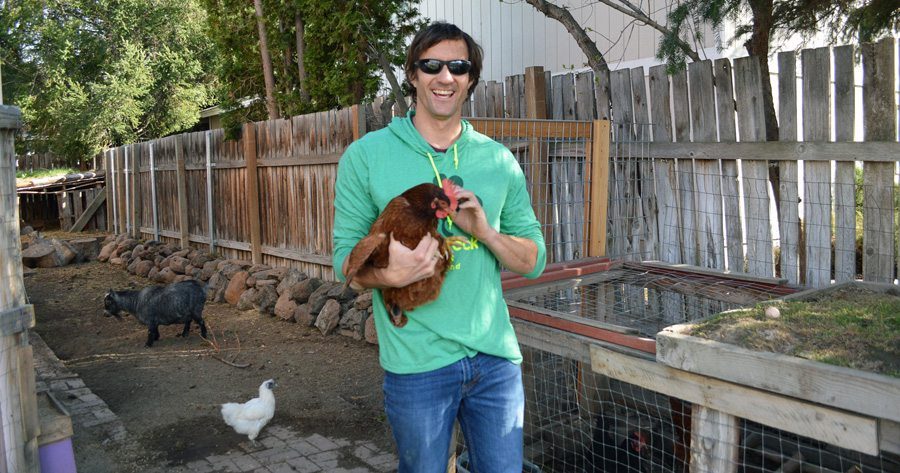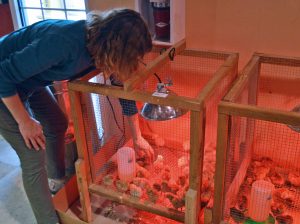
Home » Backyard chicken coop tour eggs on wannabe beak owners
Backyard chicken coop tour eggs on wannabe beak owners

April 12, 2018
Tour De Coop event on April 21 offers scoop on a dozen coops
Annette Pederson scooped up the fluffy yellow chicks that had just arrived at Kennewick’s Basin Feed and Supply to start her first foray into raising chickens.
“I’m looking forward to fresh eggs, recycling all my food scraps, bug control and fertilizer,” the West Richland woman said.
She’s also giddy for what she calls, “chicken TV,” or the entertainment provided by her future hens.
“I just like to listen to them,” she said, explaining she built a chicken coop from hay panels, which she described as a “chicken RV” that she can pull around.
People like Pederson are the new flock of chicken owners Chris Albertson hopes to inspire through the upcoming Tour De Coop event, planned for April 21.
It’s sort of an open house of backyard chicken coops. Participants are encouraged to bike between the different locations — there’s 12 in all, an increase over the seven on the tour in its inaugural year.
“They can see what I’ve got going on, see what 11 other people have got going on, ask questions, and feel a little more confident when they’re getting chickens,” Albertson said.
He hopes to demystify the process, finding that many people are intimidated by the idea of raising a pet they’ve never owned.
“Some people, when they think about chickens, they get all freaked out, like it’s so much work,” Albertson said. “But this is nothing compared to having a dog or a cat.”
Albertson began raising his own backyard chickens about a decade ago. “I love seeing chickens running around and picking bugs. It’s so therapeutic,” he said.
He’s had his current set-up in Richland for about three years, where he keeps a small menagerie. “Every animal I have has a purpose. The bunnies poop in the same spot and I take that poop, which is super-high in nitrogen, and it’s like putting steroids in your plants. They do all the work for me,” he said.
Despite working full time as a math teacher at Richland High School, Albertson has a goal of providing all produce for his family from a home garden, with the exception of fruits and vegetables that can’t be grown successfully in the Tri-Cities.
His expansive garden covers much of his property and a homemade greenhouse shelters the lettuce that grows year round.
He estimates he spends about five hours a week watering, weeding and harvesting his home garden. “People think eating healthy is expensive, but if you have your own garden, it’s a little bit of work that’s worth it,” he said.
Albertson is keenly interested in lowering his carbon footprint and environmental impact to the earth.
“I’ve always tried to be mindful in everything I do, and try not to be wasteful. If I know where all my food is, that’s organic. At the store, it cracks me up when people buy organic. I imagine someone laughing as they put an organic stamp on it. The only true organic comes from your yard,” he said.
A Portland transplant, Albertson said he has seen a recent increase in interest from people in the Tri-Cities who are concerned about their personal impact on the earth or where their food comes from.
“When we first moved here, I felt like the Tri-Cities wasn’t quite ready for (Tour De Coop), but in the last three years I felt like it’s the right time,” he said.
The tour is one of six annual events hosted by the group, Runners of the Sage. The event is part of its Run for Mindful Living series, which included a 5K in early April coinciding with the last frost, to inspire the planting of this season’s crops and gardens.

Basin Feed and Supply held its annual chick day in March, an event that draws a crowd wanting to hold baby chicks, ducks and turkeys. All the fuzzy poultry is for sale.
Cashier Jessica Carroll said the most popular sellers are the Ameraucana chicks which lay a pale blue or light greenish egg. Rhode Island Reds also are a popular variety and known for being terrific layers, but they tend to be aggressive.
Carroll said customers also snatch up the Buff Orpingtons as soon as they’re in stock because the birds can be used for eggs and meat.
While the idea of raising a turkey for an organic Thanksgiving dinner might sound doable, Carroll informs novices that “turkeys are vicious” and not all birds are ideal for every backyard environment. She recommended starting with one species to get experience before determining whether it’s feasible to add in others.
The start-up costs for raising chicks can vary, but a good estimate can be about $50. This would include a feeder, waterer, heat lamp, bulb, probiotics and chicks, which run about $2 to $3 each for the most common breeds. This doesn’t include the cost of a container, since many people repurpose a plastic storage tub or other bin to hold the chicks for the first eight weeks, or until their feathers come in. Chicks can’t maintain their own body heat, which is why a heat lamp is necessary in a closely-contained environment. Pederson intended to use a former horse trough to hold her chicks.
The set-up cost estimate doesn’t include a coop, which can range in price.
Albertson built his own coop using pallets and re-used materials from Habitat for Humanity’s ReStore. Pre-made coops can run in the thousands. Carroll said some people opt out of providing their hens a coop at all, which results in chickens laying eggs wherever they choose.
“You could search for your eggs every day. It’s like Easter all year long,” she said.
Albertson estimates he spends about $60 a year on chicken feed. In return, he gets about one egg a day from March to October. During the colder months, his chickens usually lay one egg every three days.
Tri-City chicken laws
Before starting any kind of backyard chicken set-up, it’s important to check your city’s ordinances on owning chickens.
Richland and West Richland allow up to five chickens in some parts of the city, but these count toward an overall limit on pets, so owners need to factor in the number of dogs or cats already on the property.
It’s a similar story in Kennewick and Pasco, where residents can own up to three chickens, but each has a limit on the overall number of pets, with the cities categorizing chickens as pets.
West Richland is the only one of the four cities to allow roosters. A rooster often results in better egg production from the hens, but cities usually ban them due to the noise they make.
Chicks are sexed at the hatchery and considered to be 90 percent accurate. If you inadvertently end up with an unwanted rooster, Basin Feed will supply you with the number for a butcher or suggests posting the rooster on Craig’s List, where people are often looking for one to eat or own.
Neighborhoods covered by a homeowner’s association should check their covenants before setting up a backyard chicken coop. Some HOAs have more restrictive rules than the city they are located in.
Tour De Coop
Albertson invites the public to visit his coop, nicknamed “Urban Farm,” during the free, family-friendly tour from 9 a.m. to noon April 21.
Other coops across Richland, West Richland, Pasco and Benton City feature creative names like, “Cluckingham Palace,” “Egg-spensive,” or “Best Little Hen House.” There’s a punch card that visitors can have stamped as they make each stop.
Albertson said the event might inspire visitors to start their own urban farm.
“Living a self-sustainable life is an easy recipe to happiness. Studies have shown you’re healthier and you live longer if you have animals. If everyone had their own chickens, we’d never have to have the trucks hauling the eggs, or all the chicken factories,” he said.
Tour De Coop coincides with the observed events honoring Earth Day. A map of the tour and coop locations is at tourdecooptricities.com.
Local News Environment
KEYWORDS april 2018





